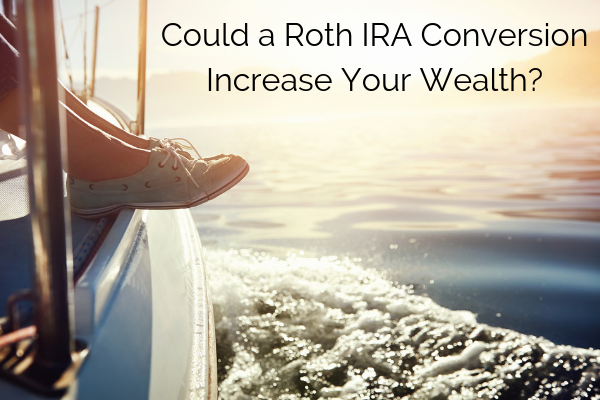The reduction in marginal tax brackets that came from the Tax Cuts and Jobs Act passed in 2017 has made it even more advantageous to utilize a Roth IRA conversion. You can convert pre-tax retirement assets at today’s lower marginal rates and never pay income tax again on that money. It can play a significant role in increasing your long-term wealth.
But first, it’s important you know the difference between the two most common types of IRA accounts.
Know Your IRA Accounts
The two IRA accounts you are likely to hear about the most are the Roth IRA and the Traditional or Rollover IRA. The main difference between the two comes down to taxes.
- A Roth IRA is funded using after-tax money and all future growth and withdrawals are tax-free. If you do have an emergency and need to withdraw from your Roth IRA account before the age of 59 1/2, you can access your contributions tax and penalty-free, but earnings on that money need to remain in the account until you are 59 ½.Many people are ineligible to contribute to a Roth IRA during their earning years because their income is above the eligibility threshold, so a Roth IRA Conversion is one of the few ways they can create a tax-free income bucket. There is currently no income rule on Roth conversions.
- A Traditional IRA uses pre-tax contribution. Those contributions grow tax-free. You pay a tax when you take withdrawals after age 59 ½ at your tax rate during the year of withdrawal.You are also likely to have to pay a 10% early withdrawal penalty if you take money out before age 59 1/2. Be aware that there are Required Minimum Distributions (RMDs) starting at age 72 with a Traditional/Rollover IRA, but not with a Roth IRA. RMDs grow as you age and may force you into a higher tax brackets later in life.
Who Should Convert to a Roth IRA?
Most people don’t realize they could increase their long-term wealth and their legacy to their heirs by utilizing a Roth Conversion. It’s often something we uncover during the planning process.
You might benefit from a Roth IRA conversion if you are someone who:
…is currently in a lower tax bracket than you think you will be in later in life. This could be due to the loss of a job, starting a new business, or early retirement when you are able to live off of savings rather than retirement assets.
Or,
…may have more retirement income than you need to cover your retirement expenses and you want to maximize your wealth. We often find that clients who have saved large amounts in pre-tax retirement accounts end up being forced to withdraw more than they need to cover their expenses after age 72, pushing them into higher tax brackets and forcing them to pay more taxes over their lifetime.
Many people don’t realize that at age 72 they have to start taking a required minimum distribution from their pre-tax retirement accounts. When this is added to other income such as pension and social security income, it is often more than they need to cover expenses. Converting pre-tax assets to a Roth IRA creates a tax-free bucket of money to be used in the future and reduce future tax payments.
Roth IRAs also don’t have a required minimum distribution, so that money can continue to grow tax-free and be passed to heirs, who will continue to receive tax-free growth in the future.
Rules to Know with a Roth IRA Conversion
So, is a Roth IRA conversion the right choice for you? There are things you should consider first.
First, taxes will have to be paid in the year of the conversion from outside savings. They cannot be paid from the account that is being converted. However, once you pay the tax, those assets will grow tax-free for the rest of your life and pass on income tax-free to your heirs.
When you’re ready to withdraw money from your Roth IRA account, keep these guidelines in mind:
- There is a 5-year wait to withdraw earnings for Roth Conversions that are set for each conversion.
- If you are over age 59 ½ the principal converted can always be withdrawn from a Roth IRA if needed.
- It usually makes sense to convert before age 72, when social security income, as well as RMDs, begin to increase your income considerably.
- Beneficiaries of Roth IRAs will have RMDs, but they will remain income tax-free.
Whether a Roth IRA conversion is right for you will depend on your current situation and your retirement goals. If you need more assistance in preparing your accounts for retirement, you can schedule a get acquainted meeting here.






